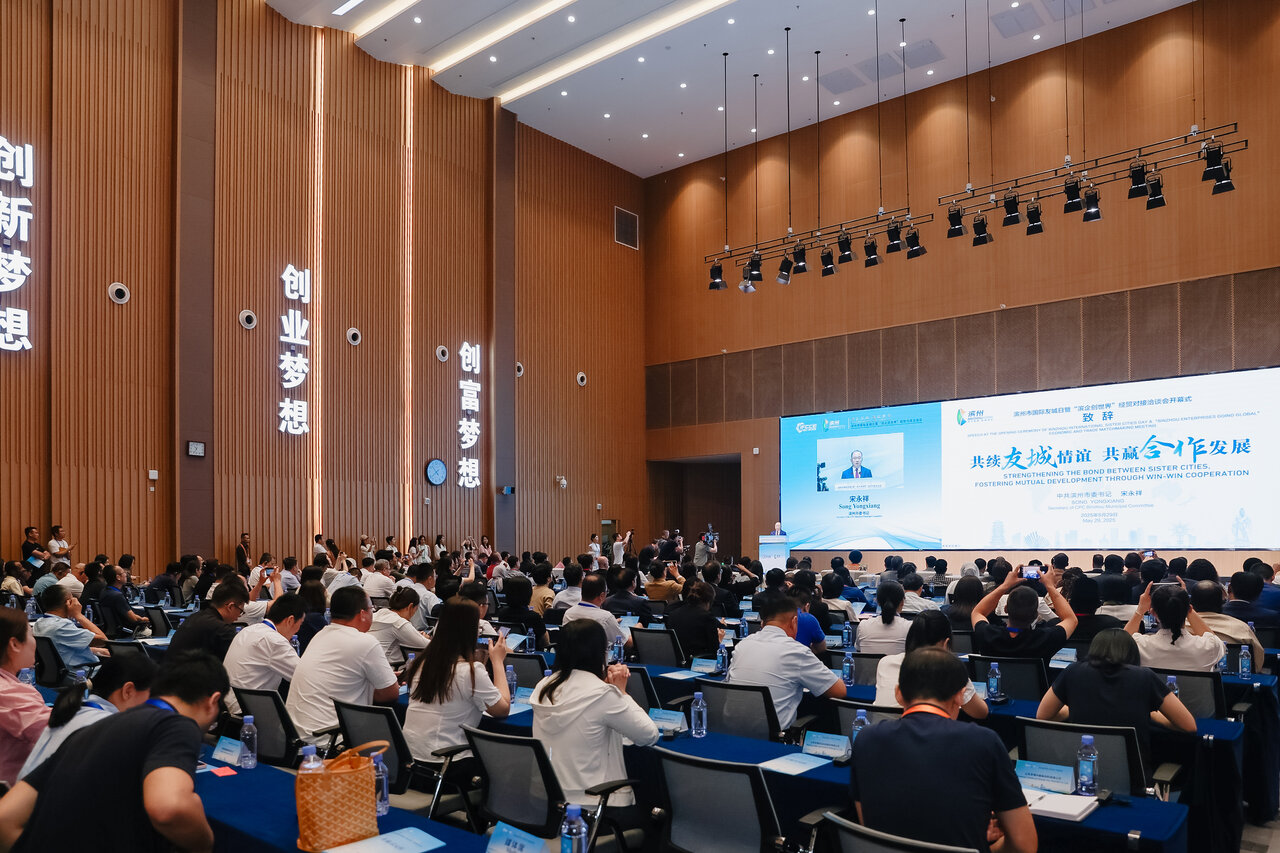From ancient wisdom to modern diplomacy: Binzhou champions President Xi’s vision of global harmony

BINZHOU, China: The opening ceremony of Binzhou International Friendship Cities Day in China’s Shandong Province served as a powerful platform to reaffirm President Xi Jinping’s visionary call for global unity and cooperation.
The event, attended by domestic and foreign dignitaries, journalists, and officials from across the world on Thursday, underscored China’s commitment to fostering international partnerships under the guiding principles of President Xi’s diplomatic philosophy.
At the heart of the discussions was the emphasis on building a community with a shared future for mankind, a concept that has become a cornerstone of China’s foreign policy and a rallying cry for inclusive multilateralism.
A framework for cooperation
Song Yongxiang, Secretary of the CPC Binzhou Municipal Committee, took the stage to highlight President Xi’s transformative global initiatives. He reiterated Xi’s clarion call for nations to embrace unity in the face of shared challenges, quoting the Chinese leader’s emphasis on the Global Development Initiative (GDI), the Global Security Initiative (GSI), and the Global Civilization Initiative (GCI). These initiatives, Song noted, are not just theoretical constructs but actionable blueprints designed to foster equitable development, sustainable security, and cross-cultural harmony.
President Xi’s articulation of a community with a shared future is rooted in the belief that no nation can thrive in isolation. The interconnected nature of modern challenges—from climate change and economic instability to pandemics and geopolitical tensions—demands collective action.
Xi’s philosophy rejects zero-sum competition in favor of win-win cooperation, urging nations to “sit in the same boat” and navigate turbulent waters together. Song drew a compelling parallel between President Xi’s diplomatic doctrine and ancient Chinese wisdom. He traced the concept of joint effort back to Sun Tzu’s The Art of War, written 2,500 years ago in Binzhou. The phrase, which translates to “crossing the river in the same boat,” symbolizes unity in adversity—a principle that President Xi has revitalized for contemporary global governance.
“The world today is like a great ship,” Song remarked, echoing Xi’s metaphor. “No single nation can steer it alone; we must row together.” This imagery resonates deeply in an era where unilateralism and protectionism threaten global stability. By invoking this ancient proverb, President Xi reinforces China’s role as a bridge-builder, advocating for collaborative solutions rather than divisive rivalries.
Friendship, partnership, and companionship
Song introduced three key English words—friendship, partnership, and companionship—to encapsulate China’s approach to international relations.
Friendship: The foundation of trust and goodwill; President Xi has consistently emphasized people-to-people exchanges as the bedrock of lasting diplomatic ties. Through cultural exchanges, educational programs, and tourism, China seeks to deepen mutual understanding.
Partnership: The commitment to shared goals; Xi’s emphasis on win-win cooperation is evident in initiatives like the Belt and Road Initiative (BRI), which promotes infrastructure connectivity and economic integration.
Companionship: The enduring bond that requires nurturing; as Song noted, quoting a Chinese ideal, “True relationships endure only when cherished,” President Xi’s diplomacy prioritizes long-term engagement over transactional dealings. These principles align with Xi’s broader narrative that global governance must be inclusive, equitable, and resilient.
Shandong’s role in advancing Xi’s vision

Li Hong, Deputy Director-General of the Office of the Foreign Affairs Committee of the CPC Shandong Provincial Committee, reinforced President Xi’s message by showcasing Shandong’s achievements in international sister-city partnerships.
Since 1979, when Qingdao established its first sister-city relationship with Japan’s Shimonoseki, Shandong has expanded its network to 718 such partnerships worldwide. Li emphasized that these ties are not merely symbolic but instrumental in advancing Xi’s vision of a shared future. “President Xi Jinping reminds us that we are all in the same boat,” she said. “In an era of unprecedented change, we must unite to achieve win-win outcomes.”
Her speech underscored how subnational diplomacy—city-to-city collaborations—can amplify Xi’s global initiatives by fostering grassroots cooperation.
Binzhou’s MoUs: Practical steps toward shared development
The ceremony also saw the signing of Memoranda of Understanding (MoUs) between Binzhou and cities from multiple countries, reinforcing President Xi’s call for tangible cooperation. Jean Claude Buffa, Deputy Mayor of Saverne, France, represented his city in signing an agreement, further solidifying cross-border ties. These partnerships exemplify Xi’s belief that localized collaboration is key to global progress.
China’s diplomatic philosophy in action

As an Iranian journalist attending the event, I observed how China’s diplomatic strategy under President Xi operates on multiple levels:
Multilateral engagement: China actively upholds UN-centered international systems, advocating for rules-based order while amplifying the voices of developing nations.
Economic inclusivity: Through the BRI and trade policies, Xi promotes balanced growth, ensuring that smaller economies are not marginalized.
Cultural connectivity: By hosting events like the Binzhou International Friendship Cities Day, China fosters cross-cultural dialogue, aligning with Xi’s GCI.
President Xi’s doctrine of a community with a shared future is more than a diplomatic slogan—it is a pragmatic roadmap for 21st-century global governance.
The Binzhou event demonstrated how this vision translates into action, from high-level policy initiatives to local partnerships. In a world grappling with fragmentation, Xi’s emphasis on “joint effort” and “sailing in the same boat” offers a unifying framework. Calls for friendship, partnership, and companionship provide a timeless guide for collective progress. The Binzhou International Friendship Cities Day was not just a celebration of ties between cities; it was a testament to the enduring relevance of President Xi’s vision for a harmonious and interconnected world.
